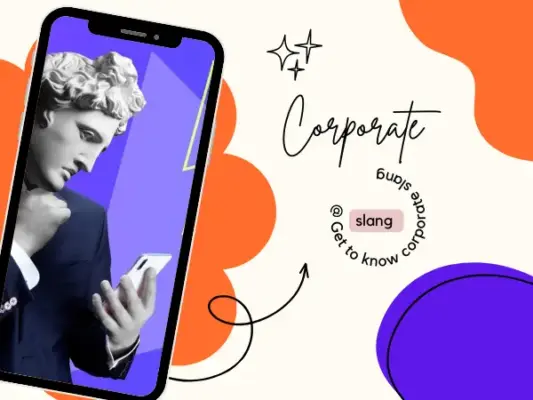
In the corporate world, language evolves to fit the fast-paced, results-oriented environment. Corporate slang—often peppered with jargon and buzzwords—can sometimes feel like a language of its own. Understanding and using corporate slang effectively can enhance communication, foster connections, and demonstrate your grasp of industry norms. This guide will help you navigate the world of corporate slang, providing insights into commonly used terms and how to use them effectively.
1. Synergy
Definition: The combined effort of different departments or organizations that leads to a greater outcome than individual efforts.
Usage: “We’re aiming for synergy between the marketing and sales teams to boost overall performance.”
Insight: Emphasize collaboration and the added value that comes from working together. Use this term to highlight how combined resources can lead to enhanced results.
2. Bandwidth
Definition: The amount of work or projects a person or team can handle at one time.
Usage: “We might need to reallocate some tasks because our team’s bandwidth is currently at full capacity.”
Insight: Use “bandwidth” to discuss capacity and workload management. It helps convey the concept of limited resources in a professional manner.
3. Low-Hanging Fruit
Definition: Tasks or opportunities that are easy to achieve or address.
Usage: “Let’s tackle the low-hanging fruit first to gain some quick wins before moving on to the more challenging issues.”
Insight: Focus on tasks that can be quickly accomplished to build momentum and demonstrate progress.
4. Paradigm Shift
Definition: A fundamental change in approach or underlying assumptions.
Usage: “The new technology represents a paradigm shift in how we handle data analysis.”
Insight: Use this term to describe significant changes in strategy or operations. It conveys a sense of transformation and innovation.
5. Leverage
Definition: To use something to maximum advantage.
Usage: “We can leverage our existing client base to cross-sell new services.”
Insight: “Leverage” is often used to suggest making the most of available resources or opportunities. It’s useful for discussing strategies and optimization.
6. Touch Base
Definition: To make contact or check in with someone.
Usage: “I’ll touch base with you next week to review the progress of the project.”
Insight: Use “touch base” for informal communication and regular check-ins. It’s a friendly way to keep in contact and ensure alignment.
7. Value-Added
Definition: An additional benefit or enhancement that adds value to a product or service.
Usage: “We’re offering value-added services to differentiate ourselves from the competition.”
Insight: Highlight additional features or benefits that enhance the core offering. It’s a key term in discussions about competitive advantage and customer satisfaction.
8. Drill Down
Definition: To investigate or analyze in more detail.
Usage: “Let’s drill down into the sales data to identify the root cause of the drop in performance.”
Insight: Use this term when referring to a detailed analysis or deeper examination of information. It conveys a thorough approach to problem-solving.
9. Onboarding
Definition: The process of integrating a new employee into the company and its culture.
Usage: “We have an onboarding program designed to help new hires acclimate quickly and effectively.”
Insight: “Onboarding” is crucial for HR discussions and improving employee experience. It refers to the initial phase of employee training and integration.
10. Game Changer
Definition: A significant innovation or development that dramatically alters the current situation or market.
Usage: “The launch of our new product is a game changer for the industry.”
Insight: Use “game changer” to describe major innovations or breakthroughs that have a substantial impact on business or industry dynamics.
11. Ecosystem
Definition: A network of interconnected entities or components working together.
Usage: “Our digital ecosystem includes various platforms that interact to provide a seamless user experience.”
Insight: “Ecosystem” is used to describe complex networks and interdependencies within business environments. It’s useful for discussing integrated systems and partnerships.
12. ROI (Return on Investment)
Definition: The measure of profitability or benefit derived from an investment.
Usage: “We need to analyze the ROI of our latest marketing campaign to determine its effectiveness.”
Insight: “ROI” is a key metric in evaluating the success and efficiency of investments and initiatives. It’s central to financial and performance assessments.
13. Scalability
Definition: The ability to grow or expand without compromising performance.
Usage: “Our new software solution is highly scalable, making it suitable for businesses of all sizes.”
Insight: Use “scalability” to discuss growth potential and the capacity to handle increased demand or workload.
14. Thought Leader
Definition: An expert or influencer who provides innovative ideas and insights in their field.
Usage: “She is considered a thought leader in the field of digital marketing, frequently speaking at industry conferences.”
Insight: “Thought leader” is used to acknowledge individuals who are recognized for their expertise and influence. It’s valuable for establishing credibility and authority.
15. Synergize
Definition: To work together in a way that produces a combined effect greater than the sum of individual efforts.
Usage: “We need to synergize our efforts to achieve the best results on this project.”
Insight: Similar to “synergy,” “synergize” emphasizes collaboration and collective effort. It’s a motivational term for teamwork and joint initiatives.
Conclusion
Understanding and using corporate slang effectively can enhance your communication and integration within the business world. Familiarize yourself with these terms to navigate conversations more confidently and to contribute meaningfully to discussions. Mastery of corporate slang not only helps you fit into the business culture but also positions you as a knowledgeable and engaged professional.